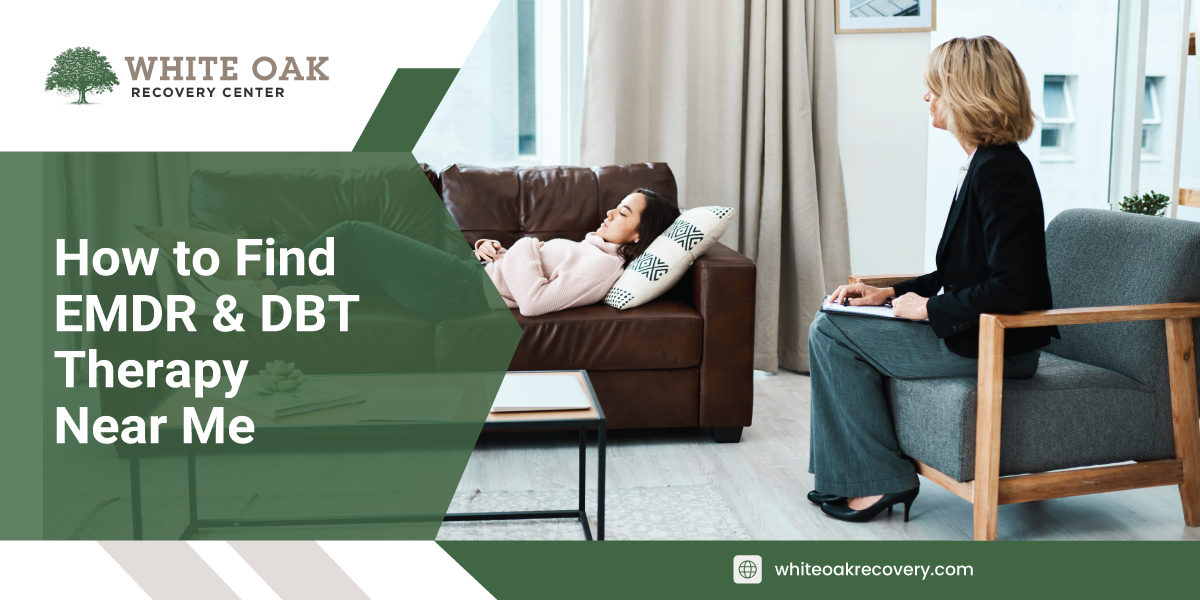How to Find EMDR and DBT Therapy Near Me


Medical Writer:
Nisa Samar
Reviewer:

Johnny Kim
Executive Psychotherapist
Medical Writer:
Nisa Samar
Reviewer:

Johnny Kim
Executive Psychotherapist
According to the National Institute of Mental Health, about 1 in 5 U.S. adults (around 59 million people) experienced a mental illness in 2022. The U.S. Department of Veterans Affairs 1 estimates that about 53% people were free from PTSD after getting trauma-focused therapies like EMDR, while only 42% people improved with medication alone. Likewise, the National Institute of Mental Health 2 says around 6% of Americans may have borderline personality disorder (BPD) during their life, and DBT is a proven treatment that helps. In light of these statistics, it is understandable that many people ask, “How to find an EMDR and DBT near me?”
Looking for quality EMDR and DBT therapy near you? White Oak Recovery Center offers a range of therapies, including EMDR, CBT, DBT, and more. Contact us today by calling 1-844-955-2438 or filling out the form.
Table of Contents
Toggle
Highlights
- EMDR and DBT therapies are different in focus, purpose, and treatment period.
- Combining EMDR and DBT can be beneficial and serve the purpose of a holistic approach.
- Finding a therapy center near you is important and offers several benefits.
- There are several steps that you need to take to find the most suitable EMDR and DBT therapy center.
What Is EMDR and DBT Therapy?
Eye Movement Desensitization and Reprocessing (EMDR) and Dialectical Behavior Therapy (DBT) are therapies that help individuals heal from certain mental health conditions. Here is a brief description of both therapies.
How Does EMDR Work?
Eye Movement Desensitization and Reprocessing, commonly known as EMDR4, is an 8-stage treatment protocol. It was initially designed to help individuals heal from trauma caused by war, accident, or abuse. However, now its scope is expanded to treat anxiety, PTSD, addiction, phobias, and distressing life experiences as well.
During EMDR, you are asked to think about a traumatic memory, while you follow the therapist’s hand movements with your eyes or listen to tapping sounds. This technique is called bilateral stimulation. It helps your brain process the memory in a healthier way.
How Does Dialectical Behavior Therapy (DBT) Work?
Developed in the late 1980s, Dialectical Behavior Therapy 5 (DBT) was originally meant to treat Borderline Personality Disorder. However, it is now used for the treatment of other mental health issues, including anxiety, mood swings, and depression.
DBT is a type of talk therapy that helps individuals build stronger emotional connections, enhance their relationships, and make more informed decisions in life. It teaches useful skills like how to stay calm, manage stress, handle conflict, and stay present in the moment.
|
How to Find EMDR and DBT Therapy Near Me?
Finding a suitable and trustworthy EMDR and DBT therapy near you is the first step towards recovery from mental health issues. The following tips may help you:
1. Start with Online Directories
Start your search for a suitable mental health clinic by browsing online and narrowing down your search using EMDR and DBT keywords. You will find several trustworthy websites that list these services.
2. Ask Your Primary Care Doctor
This is another good option to seek advice from your primary care doctor. Ask the doctor to give you multiple options nearby so that you can compare their services. Your doctor will guide you to choose the best EMDR therapists near you.
3. Contact Local Mental Health Clinics
Contact local mental health clinics and request an in-person visit to get a better understanding of their services, facilities, and staff demeanor.
4. Schedule a Free Consultation
Schedule a free consultation with various clinics nearby. It will help you compare their approaches. Ask important questions, and see which therapist feels like a better option for you.
5. Check with Your Insurance Provider
Visit your insurance company’s website or call customer service to get a list of therapists who offer EMDR and DBT and are covered under your plan.
6. Search on Social Media or Support Groups
Social media and support groups are another effective option for finding a trustworthy clinic that offers EMDR and DBT services.

Top 4 Benefits of Finding EMDR and DBT Therapy Near You
There are many reasons why you should look for an EMDR therapist near you. The same goes for the nearby DBT therapy center, and this proximity offers various benefits, including:
1. Better Access to Care
You can have better access to care if the therapy center is near you. It is easy to reach the rehab in case of an emergency.
2. Reduced Travel Time and Costs
You don’t have to travel long distances, which saves travel time and costs. The financial savings can be spent on treatment.
3. Support From the Local Community
You get emotional support from your family, friends, and colleagues. They can visit the center without worrying about strict visiting hours, making it easier to stay connected during your recovery.
4. Better Therapist-Client Bond
An EMDR and DBT therapy center near you allows you to visit more frequently, which helps develop a better connection with your therapist. This connection is very important for recovery from:
- Trauma
- Depression
- Anxiety, etc
Benefits of Combining EMDR and DBT for Optimal Results
Combining EMDR and DBT can expedite the healing process. Here are some of the potential benefits of this combination:
- EMDR can improve individuals’ condition to a point where they are no longer afraid of talking in a group. In other words, they are ready for DBT to take control and try to complete the healing process.
- EMDR helps lower the emotional reactions caused by past trauma. After these emotional triggers are removed, it becomes easier for individuals to use the skills they learnt in DBT.
- While undergoing EMDR, some individuals experience intense emotions. DBT offers various tools to cope with these feelings. The tools used in DBT may include deep breathing, staying present, and managing emotions.
- Trauma can take over your mind, filling it with haunting memories. EMDR helps clear out that stress, so people can focus better and learn the helpful skills taught in DBT.
- Some individuals find EMDR challenging. The group support in DBT encourages them to face those challenges and stay calm throughout the EMDR healing process.
Is EMDR Covered by Insurance?
Yes, EMDR therapy is often covered by insurance, especially when it is considered medically necessary for conditions like PTSD, depression, or anxiety. However, coverage depends on your specific plan, provider network, and mental health benefits.
Not sure if your EMDR or DBT treatment is covered by insurance? Verify your insurance online or call us at 1-844-955-2438, and we’ll help you find the best plan for your needs.
EMDR and DBT Treatment at White Oak Recovery Center
White Oak Recovery Center has licensed mental health professionals and offers various kinds of therapies, including:
- Eye Movement Desensitization and Reprocessing (EMDR) Therapy
- Dialectical Behavior Therapy (DBT)
- 12-Step Facilitation Therapy
- Cognitive Behavioral Therapy (CBT)
If you or a loved one needs therapy for substance use disorder, anxiety, depression, trauma, or other mental health conditions, contact White Oak Recovery Center at 1-844-955-2438. You can also quickly fill out this form.
Client Review – Jessica M.
“White Oak Recovery Center exceeded my expectations. The facility was peaceful and well-maintained, and the staff were always supportive and kind. My therapist truly listened and helped me work through issues with care and expertise. I felt safe, understood, and supported every step of the way.”
FAQs about EMDR & DBT Therapy
Still have more queries in mind! Here are some of the frequently asked questions about EMDR & DBT therapy near you.
Can I get EMDR and DBT from the same therapist?
Yes, it is possible to receive both EMDR and DBT from the same therapist, as long as the therapist is properly trained and licensed in both therapeutic approaches. However, this decision should be taken with the consultation of your therapist.
How do I know whether to choose DBT or EMDR therapy?
It depends on the type of mental health issues you are facing. EMDR focuses on trauma, PTSD, anxiety, and distressing life experiences. The decision about when to consider DBT also depends on the type of issues, such as mood swings, depression, self-harm, and anxiety. That’s why you should consult with your therapist to decide which therapy suits you better.
What should I look for when choosing a DBT or EMDR therapist?
You should look for a therapist who is trained and certified in EMDR or DBT. Make sure that they have already treated individuals with the same issue as yours. You can also ask about the details of therapy, such as the duration of treatment and the treatment style of your therapist. It is also important to check if they accept insurance or offer affordable insurance plans.
Can teens and children receive EMDR or DBT treatment?
Yes. EMDR works well for children and teens with PTSD. It helps with trauma from things like abuse, neglect, accidents, and medical issues. EMDR is also useful for problems like anxiety, grief, fears, and attachment issues. DBT and EMDR therapists need special training to use EMDR effectively with young clients.
What should I expect during my first EMDR or DBT session?
In the first session of EMDR or DBT, the therapist may ask about your background and the challenges you’re currently facing. For EMDR, the therapist might explore past traumatic experiences, emotional symptoms, and possible triggers. For DBT, the therapist may discuss your current issues, do an initial assessment, and explain the basics of the treatment process, including setting some initial goals.
Sources
- National Institute of Mental Health. (2024, September). Mental illness. U.S. Department of Health and Human Services, National Institutes of Health. Retrieved July 2, 2025, from https://www.nimh.nih.gov/health/statistics/mental-illness
- Mossini, M. (2024). Efficacy of dialectical behavioral therapy skills in addressing emotional dysregulation among adolescents: A systematic literature review. International Journal on Social and Education Sciences, 6(3), 439–451. https://doi.org/10.46328/ijonses.684
- National Institute of Mental Health. (n.d.). Borderline personality disorder. U.S. Department of Health and Human Services. Retrieved July 2, 2025, from https://www.nimh.nih.gov/health/topics/borderline-personality-disorder
- Gainer, D., Alam, S., Alam, H., & Redding, H. (2020). A Flash of Hope: Eye Movement Desensitization and Reprocessing (EMDR) Therapy. Innovations in Clinical Neuroscience, 17(7–9), 12–20. https://www.ncbi.nlm.nih.gov/pmc/articles/PMC7839656/
- Jones, B. D. M., Umer, M., Kittur, M. E., Finkelstein, O., Xue, S., Dimick, M. K., Ortiz, A., Goldstein, B. I., Mulsant, B. H., & Husain, M. I. (2023). A systematic review on the effectiveness of dialectical behavior therapy for improving mood symptoms in bipolar disorders. International Journal of Bipolar Disorders, 11(1), Article 6. https://doi.org/10.1186/s40345-023-00288-6


Am I covered for addiction treatment?
Your insurance may cover treatment. Call now for an entirely free and confidential assessment. Recovery starts with a phone call.

Medical Disclaimer:







